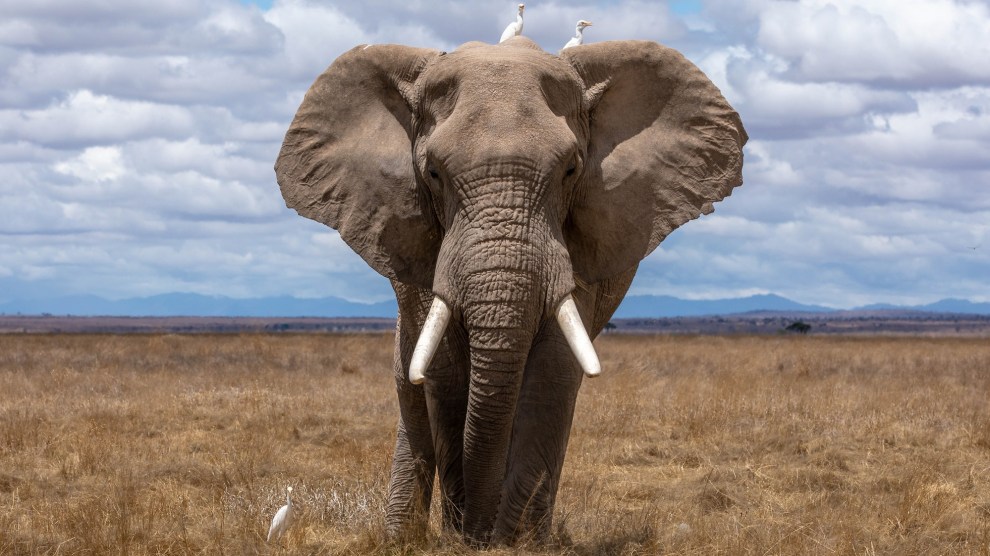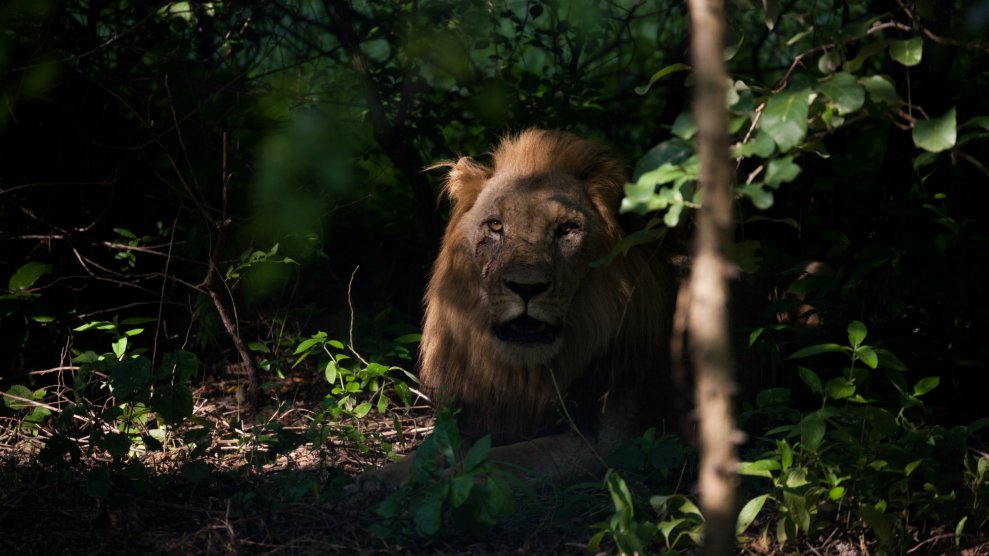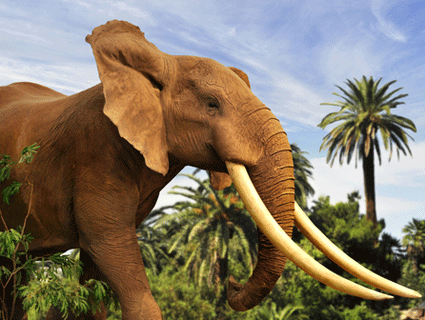
Moiz Husein/ Getty
One of the very few certainties in life is that poaching elephants is a terrible thing to do. It is also a lucrative thing to do because of the profitable market for ivory tusks in China. As a result, the population of these intelligent and magisterial animals in Africa and Asia has plummeted. In the early 20th century, several million elephants roamed in Africa; the most recent estimates put the number around 400,000. The World Wide Fund for Nature recently warned that African elephants would be extinct by 2040 if nothing were done to put a halt to poaching, which they estimate kills one elephant every 20 minutes, or 20,000 of them a year.
“Poachers generally use Kalashnikovs or poisoned arrows,” Pauwel De Wachter, the WWF coordinator for West Africa, said in a statement that appeared in Newsweek. “These weapons hurt the animal, but do not kill them immediately. Once the elephant is on the ground, the poachers cut his tendons to immobilize it, condemning them to a painful death. So that the elephant empties more quickly of his blood, they cut his trunk.”
Which is to say, it takes a special kind of capacity for cruelty, even evil, to be an elephant poacher. And yet evil is not the word that comes to mind when watching the life of a man identified as X, a Kenyan professional elephant poacher who is the lead character in When Lambs Become Lions, a documentary film by Jon Kasbe that is now in New York, Washington, DC, and Los Angeles. For three years, Kasbe lived with X, who comes from a long line of elephant hunters. His father disappeared after being shot by rangers and abandoned to die in the bush. “If my father is dead, I pray to God that he rests in peace,” X told Kasbe when they first met. “I might kill elephants, but at least I don’t kill men.”
For 79 minutes, Kasbe takes us into the intimate lives of three men who are attempting to survive in the Kenyan bush after the government cracked down to destroy the ivory trade. X and his partner Lukas have both followed their fathers’ profession and became low-level ivory dealers. X’s cousin Asan has taken the high road and works as a wildlife ranger, a noble but financially unsustainable profession. What unfolds is not a predictable morality play with clear villains and heroes, but a remarkable glimpse into the real lives of men trying to survive when their world is disappearing. As Glen Kenney wrote in the New York Times, “it’s a striking, human portrait of men in trouble, looking for escape and possibly redemption.”
I caught up with Kasbe to talk about his film and the men with whom he lived for three years as he was making it. “These are charismatic, complicated, and relatable men who do illegal or abhorrent things,” he said. “I didn’t understand them and wanted to. I wanted to explore their complexity and remain open to understanding things that were much easier to hate.”
What assumptions did you have about what you were going to discover?
Five years ago, I wasn’t excited about going to Kenya to explore this idea because so much had been done on it. But everything approached it from the perspective of the rangers, or used some type of outside character who’s not actually Kenyan or African to be our vessel into the world. There were all the typical white-savior things you see in those kinds of stories.
But I hadn’t seen anything that actually tried to understand it from the perspective of the hunters. I’d done other projects in Kenya, and I had quite a few friends there who were urging me to meet this character X who lived in northern Kenya, and who they claimed would flip everything I thought I understood upside down. I was very skeptical and quite resistant. Eventually I was convinced and figured I would just spend time with X and see if we could connect and understand why he does what he does.
What assumptions needed flipping?
What we were seeing was this very traditional Hollywood black-and-white, good-versus-evil storytelling, which makes sense. It’s digestible, it’s easy, and you come away knowing what to do and how to feel. But my sources were saying that people who live there understand that it’s not black and white, and that poachers become rangers and rangers become poachers. And that these two sides actually aren’t separate in a lot of ways. They’ve grown up together, and they all know each other and they’re all trying to survive. Neither side is coming out really on top or feels like they’re winning. Both sides are waking up and going to sleep thinking about how they’re going to feed their kids. And when you’re in that mindset, ethics is a privilege.
What was your first impression of X?
X wasn’t ashamed about what he was doing. He was very straightforward, and he just laid it out for me. He was like, “Look, yeah, we’re out here killing elephants, but our counterparts are killing humans, and there’s no repercussions for that, there’s no system that holds them accountable.” He’s like, “My father was shot 11 times in the head when I was a child and it got swept under the rug. No one did anything about it. He was killed because he was known for being an ivory dealer.” So there’s a lot of bitterness towards the whole system. This also ties into his motivation for being a part of the project. He saw this as an opportunity to show what his life is actually like and embrace some of the realities that a lot of other work had skimmed over or ignored.
Can you tell me what it was like to spend all this time with X?
X is an opportunist. He is a manipulator. He’s got a gift for his words and will do whatever he has to do to survive. That doesn’t just translate to dealing ivory, that translates to friendships, to family, to every part of his life. We were traveling around together, and I wanted to get some shots of elephants. I asked him where we could go to get some basic footage. He said, “Let’s just go to the conservancy.” He said we should drive right in. I said that any time tourists go to conservancies, they have to pay a few hundred dollars. But X insisted, and when we got to the gate, X jumped out and he goes up to the man at the gate and talks to him for a few minutes. He comes back in the car and the gate just opens up and we drive through. I asked how he convinced them not to charge a white guy for access. “Oh, I just went up to him and told him that you were one of the big bosses at the NGO, and if they don’t let you through, they’re going to get fired.” He believes anything is possible, and he kind of works reality and makes it possible. This is exactly the type of mentality you need when you’re trying to work with poachers in a climate that is so dangerous and so risky.
Then there are the rangers, who are charged with protecting elephants. How much do rangers earn, and how much could a successful poacher earn? You explore the incredible financial hardship that the guys who are doing noble work have to endure.
Rangers make $100 a month, when they’re paid, and over the four years I was there, payment was very inconsistent. There were times when they were paid on time and times where a month, two months, or three months would go by without pay. Then, maybe they get a single month’s pay and then it would get delayed again. None of them feel like they can rely on that. So they find other creative ways to make the money they need to feed their families, mainly by taking bribes. They’ve got a gun, they’ve got a uniform, and that gives them power and status, so they’ll just arrest people and take bribes. It’s really sad. They don’t want to be doing this, and the people they’re arresting are not people they don’t like. This is their community, but they don’t know what else to do.
One incredibly powerful scene was X, Lukas, and Asan watching a government-sponsored, televised mass burn of confiscated elephant tusks.
Here the president of your country is standing up and saying tusks have no value unless they’re on our elephants, and we’re going to destroy all these tusks to kill the market. These rangers and poachers don’t look at that as a sign of respect for the animals. They don’t look at that as a sign of understanding conservation. They look at that as a sign of deep international pressure. They understand that a lot of international funding came in to support that act and destroy all the wealth that they have risked their lives to collect. They’re going out there with guns that don’t work, wearing sandals, and they’re not getting paid half the time. Then they watch their president destroy it all in front of them. What that did to morale was insane. They watched hundreds of millions of dollars that they had collected over the last five years just being destroyed, while they’re not being paid.
Did X ever look into the future and imagine what might happen if he and the other poachers were so successful the elephant population disappeared?
Yeah, they had the token answer, “We don’t want that. We’re not killing these things at a rate where we’re trying to make them extinct. We’re killing them at the rate that we need to survive.” The other thing is that they would see elephants all the time. There’s this idea of extinction, of declining numbers that they hear about in the news and in the media, but then they’d look around and see elephants all over the place and be like, “What is going on?”
By the end of the film, I could really see the poachers’ point of view. It was very hard to think of them as monsters. What they do is monstrous, but their circumstances are incomprehensible to those of us who don’t have to deal with these questions in our lives.
I was hoping for a clear answer, for a way to tell people what to do. The deeper I went into this world, the more I realized just how complicated it is, and how warped our perception is of the issue. What do you do with the ivory? Do you sell it and then use that money to conserve more? But then you’ve fueled the market. Or do you destroy it, and your rangers on the ground are demoralized and confused. They don’t even know why they’re not getting paid. One of the few things that rangers and poachers agree on is that rangers are not treated or paid fairly, and if they were, poaching would happen less.
There have been a lot of people from outside of Kenya, outside of Africa, who have swooped in and tried to solve these issues, and that’s not where the solution is going to come from. The solution is going to be local. They’ve been in these guys’ shoes, they understand what it’s like to wake up and not know if you’re going to have food. They understand what it’s like to watch someone die. They understood what it’s like to not be able to feed your kid and not know if you can keep your child alive. Without having that understanding, without that mindset, it’s really hard to get it.
















